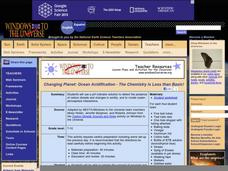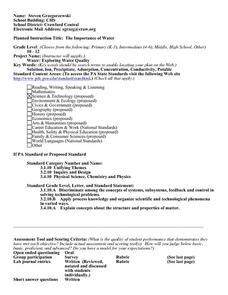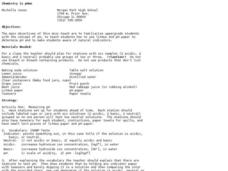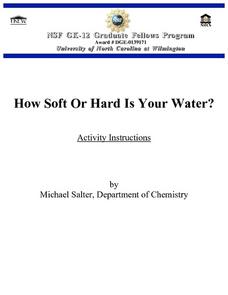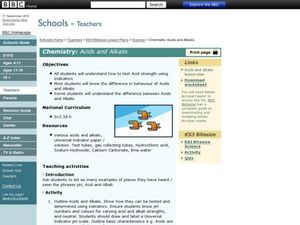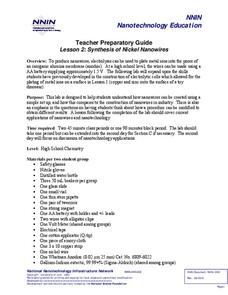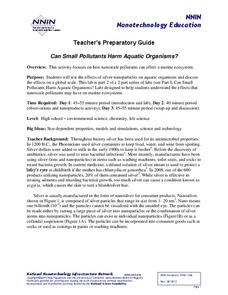Curated OER
Lead and Mercury Ion Catalase Inhibition
Students participate in a laboratory investigation in which they observe the effect of temperature and pH on enzyme activity. Students also examine exposure to heavy metal ions and the effect that may have on enzyme activity.
Curated OER
Changing Planet: Ocean Acidification - the Chemistry is Less than Basic!
A video and laboratory investigation are highlights to this instructional activity on acidification of ocean water due to increased atmospheric carbon dioxide. Using bromothymol blue (BTB) as an indicator, pupils analyze the amount of...
Cornell University
Nano Interactions
Tiny particles can provide big learning opportunities! Middle school scientists explore the world of nanoparticles through reading, discussion, and experiment. Collaborative groups first apply nanotechnology to determine water hardness....
Curated OER
Water Quality Tests Explained
Learners define all eight water quality parameters and list at list one source for each of the eight water quality parameters. They determine how each of the eight parameters affect river ecosystems.
Chymist
Esters: An Introduction to Organic Chemistry Reactions
Scratch and sniff an introduction to organic chemical reactions. A creative lesson has individuals study the esters commonly used in scratch-and-sniff stickers and advertisements. Following the lab procedure, scholars create the organic...
Curated OER
Household Chemistry
Students use indicator paper to determine if substances are acidic, basic, or neutral. They test for Ph levels in them. They investigate the effect of oxygen on darkening fruit cut and exposed to the air. They observe vitamin C as an...
California Academy of Science
Coral and Chemistry
Using cabbage juice as a pH indicator, future scientists explore the effect of increasing carbon dioxide on the pH of the ocean and relate it to the health of coral reefs. Ideal for an earth or environmental sciences course, this lesson...
Curated OER
# 14 Experimenting with Copper (II) Solutions
Students determine that the relative concentration of copper ions in water can be determined by a color comparison. They make a copper (II) sulfate solution of a given concentration. Students dilute their initial solutions until their...
Curated OER
Devising a Set of Experiments to Test Water for Dissolved Substances
Students work together to test water samples for pollutants. They design data tables to collect and record their observations. They complete discussion questions to end the lesson.
Curated OER
The Importance of Water
Students explore the importance of water. They discuss why water is important and students design an experiment that evaluates the water quality and methods of improving water quality. Students perform testing and report their findings.
Curated OER
Ziplock Chemistry
Students investigate various chemical reactions when creating mixtures in ziplock baggies. In this chemistry lesson, students will recognize various chemical reactions and cite evidence. Safety and assessment strategies are included in...
Curated OER
Chemistry is pHun
Students investigate the pH of solutions and they learn how to use different types of indicators. In this pH lesson plan, students test various solutions with pH paper and determine if they are acidic, basic or neutral. They also test...
Curated OER
Water Resource Engineering
Students examine solubility and the significance of water. In this aqueous solution instructional activity students complete a lab activity on soil profiles.
Curated OER
How Soft or Hard is Your Water?
Students test samples of water to determine how a chemical water softener affects water's ability to form suds. After collecting their data and analyzing their results, students answer follow-up questions about their lab.
Curated OER
Ions in the Environment
Students explain the importance of the five main biogeochemical cycles. In this chemistry lesson, students discuss how ions are transported in the environment. They design an experiment to collect data on eutrophication.
Curated OER
Rusting-A Form of Oxidation
Students conduct an experiment to observe oxidation. For this chemistry lesson, students explain how rusting happens. They rank metals according to their conductivity.
Curated OER
Rusting-A Form of Oxidation
High schoolers observe the rusting process in the lab. In this chemistry lesson, students rank metals according to their conductivity. They give real world applications of this activity.
Curated OER
Life in Extreme Environments - Lakes Under Ice
Young scholars collect chemical, physical, and biological data from a local lake throughout the year. In addition, students discuss the design of an experimental structure for water collection at several specific depths as well as assess...
Curated OER
Chromatography
Students conduct various experiments on chromatography. In this chemistry lesson, students distinguish among the different types of chromatography methods. They explain how the stationary and mobile phase interact with each other.
Curated OER
Chemistry: Acids and Alkalis
Students identify substances that are acids and alkalis. In this acids and alkalis lesson, students conduct tests to determine if given substances are acids or alkalis. They test substances and explain the different qualities that make...
National Nanotechnology Infrastructure Network
Synthesis of Nickel Nanowires
It's all about the scale—they're not just wires, they're nanowires! The second lesson of the series builds on the oxidation-reduction experiment in the first lesson. Scholars synthesize a sample of nanowires using electrolysis. As they...
National Nanotechnology Infrastructure Network
Can Small Pollutants Harm Aquatic Organisms?
Nanoparticles have toxic effects on plant and animal life—even though you can't see them. The second lesson of a two-part series has young scientists conduct an experiment that exposes plant and animals to nanoparticle pollutants. They...
Curated OER
Can Chromatography Separate A Pigment?
High schoolers separate a mixture of pigments with ion exchange chromatography and predict whether the ion-exchange matrix is positively or negatively charged based on the type of pigment bonded to the matrix.
Curated OER
Electroplating for Corrosion Protection: Redox in Action
Learners define what a redox reaction is. In this chemistry activity, students electroplate some wires in the lab. They research the application of electroplating in the real world.



